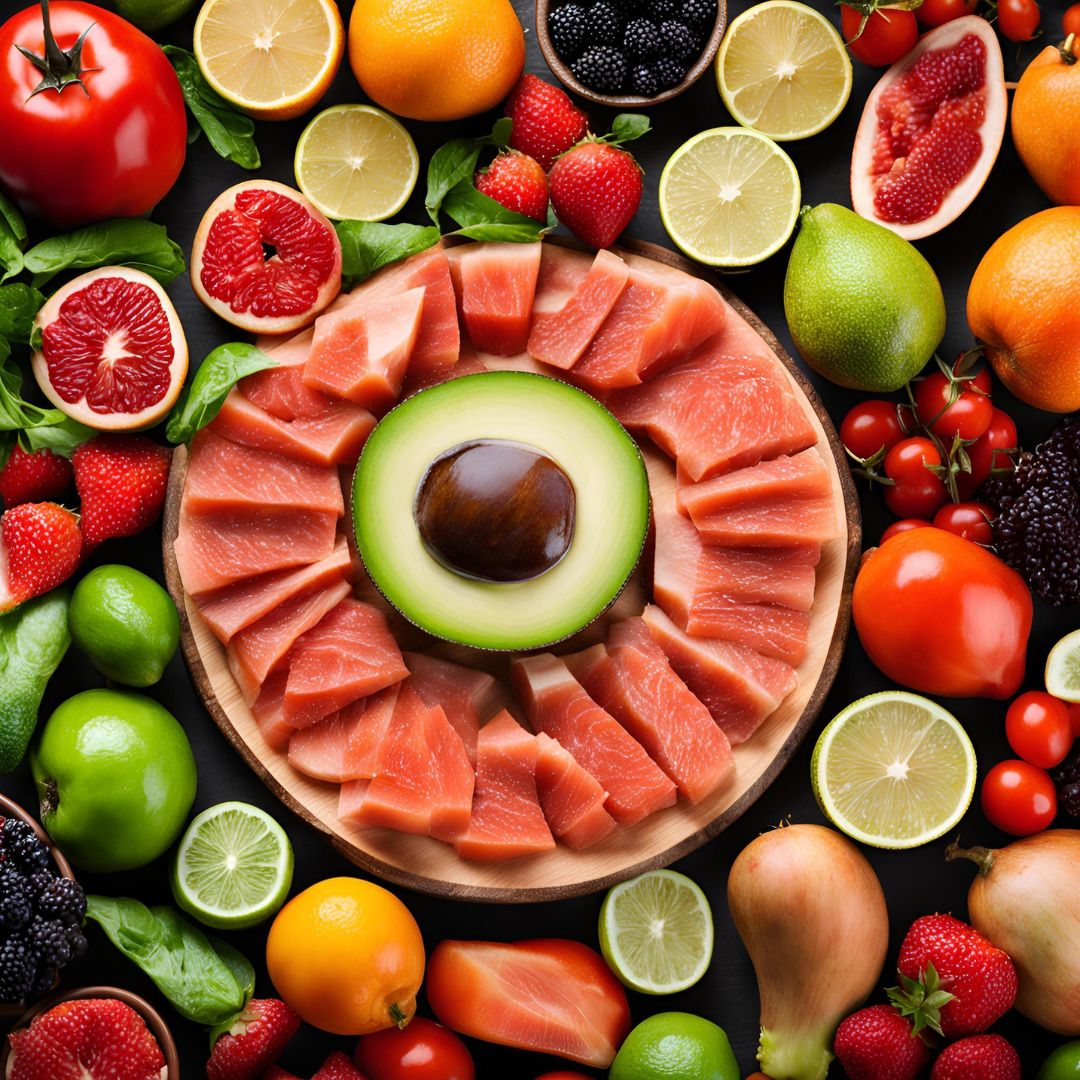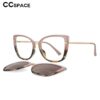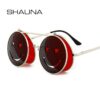Foods That Improve Eye Health – Boost Vision Naturally
Can food really improve your eyesight and reduce the need for glasses? The answer may surprise you. While some vision problems need medical help, eating certain foods can help a lot. These foods can make your eyes healthier and might slow down age-related vision issues.
Learn how natural, whole foods can boost your vision. They can also protect your eyes from common problems.
Understanding Eye Health and Nutrition Basics
Keeping our vision healthy is key for everyday life. The foods we eat are crucial for eye health. Vitamins for eye health, nutrients for vision, and good eye health nutrition help protect our sight.
Role of Vitamins and Nutrients in Vision
Antioxidants like vitamins A, C, and E slow down eye damage. Vitamin A is found in egg yolks, dairy, liver, spinach, and carrots. It’s vital for eye health.
Vitamin C is in the eye lenses and helps prevent cataracts. You can find it in broccoli, kale, peppers, and oranges. Vitamin E protects eye fats from damage and is in almonds, sunflower seeds, and avocados.
Key Nutrients for Optimal Eye Function
Carotenoids like lutein and zeaxanthin are key for the retina. They’re in chard, spinach, kale, raspberries, and peaches. Flavonoids in dark chocolate, red wine, berries, citrus fruits, and tea improve eye function.
Selenium prevents eye diseases like macular degeneration and cataracts. It’s in dairy, eggs, seafood, nuts, and seeds. Omega-3 fatty acids in salmon, mackerel, sardines, flaxseeds, chia seeds, and walnuts also support eye health.
Foods That Improve Eye Health and Their Benefits
Good eye health is more than just eye exams. Your diet is key in supporting your vision and preventing eye problems as you age. Eating a variety of eye-healthy foods can boost your vision-boosting diet. This way, you get the benefits of nutritious foods for eyes.
Fish like salmon, tuna, and mackerel are great for your eyes. They help with dry eyes and may lower the risk of macular degeneration. Nuts and seeds are also good, providing fatty acids and vitamin E for healthy eyes.
Citrus fruits are full of vitamin C, a strong antioxidant for eye protection. Leafy greens, like kale and spinach, have lutein and zeaxanthin. These nutrients protect your eyes from UV rays and support eye health.
Sweet potatoes are packed with vitamins A, C, and lutein. They’re great for your vision-boosting diet. Eggs are also excellent, offering vitamins C, E, lutein, and zeaxanthin for better eye function.
Lean meats and legumes are good for zinc, important for macular health. Adding these eye-healthy foods to your meals helps keep your vision and eye health in top shape.
Power of Omega-3 Rich Fish for Vision
Omega-3 fatty acids, like EPA and DHA, are key for eye health. They help keep your vision sharp. Eating fatty fish is a great way to get these nutrients.
Types of Fish Best for Eye Health
Salmon, tuna, mackerel, sardines, and anchovies are top choices for eye health. They’re packed with omega-3 fatty acids. These acids are vital for the retina and other eye parts. Eating these omega-3-rich fish can lower the risk of eye problems like macular degeneration and dry eye syndrome.
Recommended Serving Sizes
The American Heart Association suggests eating fish, especially fatty fish, twice a week. Aim for a serving size of about 3.5 ounces (100 grams) of cooked fish. This can greatly increase your omega-3 fatty acid intake. It supports eye health and may reduce vision problems.
Eating omega-3-rich fish regularly is a simple way to keep your eyes healthy. It helps you see clearly for many years.
Colorful Vegetables and Eye Protection
Colorful vegetables are key to keeping your eyes healthy. They are full of nutrients that help protect your vision. Carrots, sweet potatoes, and bell peppers are just a few examples of these eye-friendly foods.
Carrots and sweet potatoes have beta-carotene, which turns into vitamin A. This vitamin is vital for good night vision. Bell peppers, especially the red ones, are rich in vitamin C. This vitamin helps keep blood vessels in your eyes healthy and may prevent cataracts.
Broccoli and Brussels sprouts are also great for your eyes. They have vitamins A, C, and E. These vitamins protect your eyes from damage caused by free radicals.
But there’s more. These eye-friendly vegetables also have lutein and zeaxanthin. These carotenoids help fight age-related macular degeneration and cataracts. Eating a variety of colorful vegetables is a simple way to keep your eyes healthy and prevent vision problems.
Antioxidant-Rich Fruits for Better Vision
Antioxidant-rich fruits are key to keeping your eyes healthy. Citrus fruits like oranges, lemons, limes, and grapefruits are full of vitamin C. This vitamin helps keep eye blood vessels healthy and may lower cataract risk. It fights off free radicals that harm the eyes.
Berries, including blueberries, strawberries, and blackberries, are also great for your eyes. They’re loaded with antioxidants that help prevent macular degeneration and cataracts. Eating different berries gives your eyes a variety of nutrients for better health.
Eating a variety of antioxidant-rich fruits is good for your vision. Citrus fruits offer vitamin C, while berries have flavonoids. These natural foods give your eyes the nourishment they need to work well.
Nuts, Seeds, and Legumes for Eye Nutrition
Adding nuts, seeds, and legumes to your diet can greatly improve your eye health. Almonds and hazelnuts are full of vitamin E, a key antioxidant for eye protection. Chia seeds, flax seeds, and hemp seeds are rich in omega-3s, vital for clear vision and fighting age-related eye diseases.
Sunflower seeds are also high in vitamin E. Lentils, kidney beans, and chickpeas are loaded with zinc, important for the retina and may slow macular degeneration. These foods are also good sources of fiber and protein, making them great for your overall health and eye care.
By mixing nuts, seeds, and legumes into your meals, you can increase your intake of these nutrients. This supports your vision for the long term. Try out different recipes to find what you like best.
Essential Protein Sources for Eye Health
Eating a diet full of essential proteins is key for eye health. Eggs and lean meats are top choices for their benefits to your vision.
Eggs and Their Eye-Protective Properties
Eggs are packed with nutrients good for your eyes. They have vitamins C, E, and antioxidants like lutein and zeaxanthin. Eggs also have zinc, which helps your body use these nutrients well.
Egg yolks are especially good for your eyes. They have lots of lutein and zeaxanthin. These help protect your retina from blue light and keep your macula strong.
Lean Meats and Zinc Benefits
Beef, pork, and chicken are great for eye health. They are full of zinc, a mineral your eyes need. Zinc helps vitamin A get to your retina, where it’s vital for clear vision.
Zinc also helps make melanin, a pigment that protects your eyes. While oysters have the most zinc, other seafood and poultry are also good sources.
Dark Leafy Greens and Vision Support
Dark leafy greens are key for eye health. Vegetables like spinach and kale are packed with lutein and zeaxanthin. These carotenoids protect your eyes.
Lutein and zeaxanthin block UV light and prevent eye diseases like macular degeneration and cataracts. They also come with vitamins C and E, which are antioxidants for your eyes.
Eating dark leafy greens daily boosts eye health. They may slow eye diseases. So, add them to your meals for better vision.
Conclusion
Good eye health comes from eating a balanced diet. This diet should include omega-3 fatty acids, vitamins A, C, and E, zinc, and antioxidants like lutein and zeaxanthin. Foods like fish, colorful fruits and veggies, nuts, seeds, and lean proteins are great for your eyes.
Eating well can’t cure eye problems or fix vision issues. But, it helps prevent diseases like macular degeneration and cataracts as you get older. It’s also important to get regular eye exams, protect your eyes from the sun, and not stare at screens too much.
Eating foods good for your eyes every day helps keep them healthy. A balanced diet, along with good habits, is key to clear vision and less eye problems as you age.
FAQ
Can diet improve eyesight naturally?
No, diet can’t improve eyesight naturally. But, eating certain foods can help your eyes stay healthy. A diet full of key nutrients supports your eyes and may reduce your need for glasses.
What are the essential nutrients for eye health?
Key nutrients for eye health are vitamins A, C, E, and B complex. Also, lutein, omega-3 fatty acids, and zinc are important. They help keep your vision sharp and protect against eye diseases.
What are the best foods for improving eye health?
Foods like fish, nuts, seeds, citrus fruits, and leafy greens are great for your eyes. Sweet potatoes, eggs, and lean meatsare also good. They’re full of nutrients that support eye health.
Why are omega-3 fatty acids important for eye health?
Omega-3s in fish like salmon, tuna, and mackerel are vital for your eyes. They help with dry eye and macular degeneration. These fatty acids are good for your retina.
What nutrients do colorful vegetables provide for eye health?
Carrots, sweet potatoes, and bell peppers are full of vitamins A, C, and E. They also have lutein and zeaxanthin. These help protect against macular degeneration and cataracts.
How do antioxidant-rich fruits benefit eye health?
Fruits like citrus and berries are packed with vitamins C and E. They also have flavonoids. These help protect your eyes from damage and may lower the risk of eye diseases.
What nutrients do nuts, seeds, and legumes provide for eye health?
Nuts, seeds, and legumes are rich in vitamin E, omega-3s, and zinc. These nutrients are crucial for your retina and may slow macular degeneration.
How do eggs and lean proteins support eye health?
Eggs are a great source of vitamins C, E, lutein, and zeaxanthin. They also have zinc, which helps your body use these nutrients. Lean meats are good for zinc, which is key for eye health.
Why are dark leafy greens important for eye health?
Greens like spinach and kale are full of lutein and zeaxanthin. These protect against macular degeneration and cataracts. They also have vitamins C and E, which act as antioxidants in your eyes.





